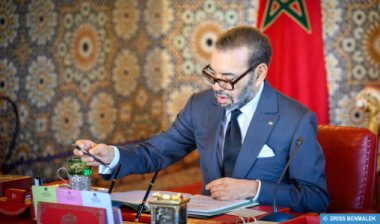
Rabat, December 6, 2024 — His Majesty King Mohammed VI, may God assist Him, delivered a message to the participants of an international symposium commemorating the 20th anniversary of Morocco’s landmark Equity and Reconciliation Commission (ERC). Held in Rabat under the theme “Transitional Justice Pathways for the Implementation of Sustainable Reforms,” the event brought together global experts and stakeholders to discuss Morocco’s progress and contributions to transitional justice.
The Royal Message, read by Amina Bouayach, Chairperson of the National Human Rights Council, highlighted the significance of the ERC’s establishment as a pivotal moment in Morocco’s democratic evolution. The King emphasized the Commission’s role in consolidating the rule of law, fostering national reconciliation, and addressing historical human rights abuses transparently and objectively.
A Bold and Proactive Vision
In his message, the King reflected on the creation of the ERC as a continuation of the work of the Independent Commission on Compensation for Victims of Enforced Disappearance and Arbitrary Detention, founded by His late Majesty King Hassan II. He described the initiative as a sovereign and proactive decision rooted in a new concept of authority that prioritizes accountability, justice, and a dignified life for all Moroccans.
“This process aimed not only to achieve national reconciliation but also to make transitional justice a cornerstone of the democratic transition,” the King stated, noting that it was underpinned by Morocco’s unique identity and a commitment to addressing past violations without bias.
Groundbreaking Achievements
The King underscored several key achievements of the transitional justice process, including:
- Comprehensive investigations into historical abuses and public hearings to uncover the truth.
- Individual and collective grievance redress with a focus on gender perspectives.
- Civil society’s active engagement in shaping and supporting the process.
- Promotion of public debates and community-based discussions on critical reforms.
These efforts, he noted, led to a harmonious and consensual democratic transition that strengthened Morocco’s institutional and legislative framework, reinforcing the protection of human rights across political, economic, social, and cultural domains.
A Model for the Region
The King proudly highlighted Morocco’s pioneering role in introducing transitional justice to the Arab and African regions, serving as a model for other nations. The Moroccan experience, he stated, has contributed significantly to the global discourse on transitional justice, showcasing its potential to foster development, democracy, and reconciliation.
Challenges and Opportunities
Acknowledging that the work is far from complete, the King stressed the importance of continuous efforts to perfect Morocco’s democratic model. He expressed hope that the symposium would spotlight the interplay between transitional justice and sustainable reforms while showcasing Morocco’s achievements as a reference point for other nations.
The King concluded his message by welcoming participants and wishing them success in their deliberations, emphasizing the enduring importance of protecting dignity and rights for all. The symposium serves as a timely reminder of Morocco’s strides in transitional justice and its ongoing commitment to justice, equality, and development.






